- Home
- Newt Gingrich
Pearl Harbour and Days of Infamy Page 15
Pearl Harbour and Days of Infamy Read online
Page 15
The warden half turned back to Genda.
“That’s why you should be off this bridge. Get yourself killed out here like this.”
Genda again held up his diplomatic pass, saying nothing, and the warden shook his head.
“Bloody stupid slant eyes. If you want to get killed out here, that’s your business.”
“I speak perfectly good English,” Genda said slowly. “And I am an officer in my country’s navy.”
The warden, embarrassed, actually raised his right hand and offered something of a salute, mumbled an apology, and moved on, disappearing into the smoke from the burning Heinkel that still cloaked the bridge.
Genda turned back to watch the unfolding battle. The main action was down along the East End, from Tower Bridge three miles away clear down to Greenwich. With the well-made excellent Zeiss binoculars that he was using to observe the fight, he estimated at least two hundred or more German bombers were at work, dropping their loads from what appeared to be several thousand meters up, above the range of the lightweight 20- and 40-millimeter antiaircraft guns, which were basically all that the British could muster for the defense of the city except for a few batteries of heavier weaponry clustered around the center of the city and government buildings.
The concussions from the heavier bombs, 500 kilos or more, slapped against him, even from this distance. Smoke was columning up. darkening the skies. A huge secondary lit off. He saw the fireball soaring heavenward, counting the seconds until the blast washed over him. It was staggering even from miles away. Most likely the Woolwich arsenal, he thought. Still operational from the reports he had received, but a few days before most likely a thousand tons or more of explosives had lit off with that one.
A high, almost bell-like tinkling interrupted him for a moment, and he saw a scattering of shell casings hitting the pavement in the middle of the bridge, bouncing, coming to rest, cast-offs from .30-caliber and 7.7- and 20-millimeter guns; hundreds more were pocking the water of the Thames. High overhead the sky was a latticework of contrails, the battle up there between Spitfires and ME-109s raging at twenty thousand feet or more, remote from what was transpiring down here, and yet still a deadly struggle for control of the air over London. Nearly invisible dots twisted and turned, as if their intent was to weave an elaborate pattern of contrails in the skies. It was beautiful to watch, and Genda, head tilted back, focused on it for a moment.
Any semblance of formations seemed to have broken down, the heavenly battle a hundred duels, a puff of smoke, a flash of flame, the dot disappearing, contrail following it turning away, German or British he could not tell. Three contrails were streaking down from the west, up there, far away up there, coming out of the sun, pouncing, another flash of flame, the three continuing on into a sharp spiraling turn, looking for more prey. And how he wished with all his heart to be up there now. It almost didn’t matter which side, just to be up in the thick of it, pitting his skills against any who would dare to challenge him, again the thought of the samurai duels of old.
There must be a thousand planes in the sky overhead, Genda thought, filled with a sense of wonder; the greatest air battle in the history of warfare was taking place this day, and here he was, stuck on the ground. Overhead, just from the German side alone, more aircraft than his entire navy could ever hope to launch.
An explosion directly above and he looked up to see what appeared to be a Hurricane, disintegrating, both wings sheering off, plummeting down in a nearly vertical dive, a 109 pulling out behind it, engine screaming loudly as the pilot leveled off and began to climb, heading southeast, apparently racing for home, fuel most likely short.
With a sense of horror Genda watched as the wreckage of the Hurricane tumbled down to fall somewhere along the north side of the river; and there, just above the burning fuselage, trailing smoke, was the doomed pilot, arms and legs flaying, parachute tangled into a burning streamer like a candlewick about to snuff out. The wreckage of the burning plane, and the man who had flown it but seconds before, crashed down on the north side, somewhere up near Trafalgar Square. He felt a wave of pity for the man, more likely a boy, since it was known that the RAF was indeed scraping the bottom of the barrel, putting up barely trained youths of nineteen with less than twenty hours of training in their planes. In the Japanese navy, it was expected that a pilot would have at least three hundred hours or more in a combat aircraft before he was deemed ready for battle. Planes and pilots, for Japan, were too valuable to be wasted lightly. But for England, they were on the desperate edge.
He wondered if the doomed youth had been the same pilot who but a few minutes before had, with such high zest, pulled a victory roll over Parliament, climbing back up to meet his fate in the tumult raging above.
More explosions from the East End drew his attention, while overhead the pulsing roar of hundreds of engines grew in intensity, the vast German air armada banking, turning about to head back southeastward to reload and, most likely, return come night, the fires of the East End now their beacon.
He shook his head.
The clattering of a bell sounded behind him. He saw a white .ambulance racing across the bridge, behind it three fire trucks and several lorries loaded with infantry. Downstream, a fire boat was at work, streams of water arching high in the air, trying to douse a fire consuming a burning freighter. A bomb detonated near it, rocking the boat, yet it kept to its duty. Down on the river embankment behind him, half a dozen men, up to their thighs in muck, were dragging out the body of the dead German from the Heinkel. He turned away from the chaos to walk back toward his embassy, the report already forming in his mind.
To have such power... to have such power and not to squander it as it was being squandered this day by the Germans, that would be the key to a Japanese victory.
Oahu: 11September 1940 7:00 a.m. Local Time
James Watson, former naval commander, now associate professor of mathematics at the University of Hawaii, eased in a little more rudder to counter the engine torque, eased back on the stick, not too much, just a touch, and the Aeronca Chief with all its fifty horsepower floated off the dirt strip and into the air. Nose down slightly, build up climb-out speed to sixty, then stick back again, best rate of climb a stately four hundred feet per minute. Not like the first ride he had been on but still such a joy, a slight buffet from the gentle trade winds coming in from the northeast. High enough now to circle out over the ocean; if the engine cut off, more than enough altitude to glide back to the private landing strip at Kaneohe, just south of the naval air station there.
A lone PBY Catalina twin-engine recon plane was taking off from the small bay, white foam spraying out, and James felt a touch of real envy. If only he had discovered flying back when at the Naval Academy twenty-five years ago, how different his career might have been. It took a Japanese pilot to show him the joy of it, and as he did nearly every time he took off, he wondered how Fuchida was.
Cecil had written him a note about Fuchida, describing their last meeting, and James knew why Fuchida had stopped their correspondence. After getting his private license and buying the Aeronca, he had actually sent a photo of himself with the plane to his old friend. The motivation why, he wasn’t sure. Part of him could never forgive nor forget what happened that day, but on the other side, Fuchida had not been personally involved and according to Cecil had most likely been sent out to rein in the hotheads who had launched the attack. Part of it as well was, he knew, to send a message.
Navy rehab had done some fine work with him. The rubberized hand looked fairly lifelike, fit over the stump comfortably. When he flew he used the mechanical claw hand; it was easier to grasp with and fortunately with flying he only needed his left to work the throttle and trim tab master switch; and there was always someone around to throw the prop for him. Nearly everything else was done with his right; once he demonstrated he could do so to his instructor, an old retired army pilot from the last war, he was cleared to solo and then got a license. His instructor, D
on Barber, had an artificial foot; the real one he said was lost in a cloud somewhere over northern France back in 1918 and was still floating around up there, looking for its owner. It took one of Don’s friends to coax out the real story. How he had been pounced, shot up, his right foot damn near blown off, and he had started for a cloud, looking for cover, only to realize his wingman was in trouble, then turned about to go back for him, dropping both Germans they had tangled with. He escorted his wounded wingman back and then passed out from loss of blood after landing his shot-up Spad. Somehow James felt his own injury paled in insignificance next to this man. At least Don had been able to fight back. All he had managed to do was be in the wrong place at the wrong time and had a hand blown off. He had not been able to do a damn thing in reply. Sure, the navy had made a big to-do over his Purple Heart, a Bronze Star for supposedly helping to pull a drowning civilian out--he was ashamed for ever allowing that medal to be forced on him-- and then he’d been promoted and retired out as disabled.
Learning to fly had been his real therapy, rebuilding confidence, giving him a goal, and his instructor had been the therapist, coaching him along, understanding the need, the two talking about the strange phenomena of “limb memory,” how Don said he still woke up in the middle of the night, foot itching like hell, and would actually reach down to scratch it, the same for James who still at times forgot he was missing a hand and actually reached out to pick something up, or got a damn annoying tingle that could never again be scratched.
He knew that was the other reason he had sent the photo to Fuchida. He made a point of wearing the mechanical claw rather than the cosmetic rubber hand, the claw holding the leather flight helmet and goggles Fuchida had given him. He wanted him to see what his comrades had accomplished when they hit the Panay. He never heard back from him.
He leveled off at three thousand, cruising comfortably down the east coast of the island, his favorite flight, following the coast toward Diamond Head. Still early enough that he didn’t have to worry about the turbulence that would build up to gut-wrenching levels by midday. It was a great day for flying, peaceful, like sliding on glass, the way he loved it. He wished he had dragged Margaret along. She had begrudgingly accepted his new hobby, the seventeen-hundred-dollar cost of the plane, and even gone up a few times, but the slightest bump and back to the airport they went. Today, with the side windows pulled back to let the breeze in, it was just so damn beautiful, the white surf, startlingly blue ocean, even up here the air rich with that smell of the sea, the lush tropical green clinging to the mountainsides. It was still three hours before he had to be on campus to teach, plenty of time to just cruise around and enjoy the early morning light illuminating the mountains. He gained another five hundred feet, easily clearing up over the east rim of Diamond Head, the breathtaking view of Waikiki Beach beyond. Off in the distance he saw something that made his heart swell; it was distant but clearly visible ... a carrier putting out to sea from Pearl.
He saw a plane coming in from the east, a beautiful sight, one of the famed Pan American clippers, which now flew a regular route from San Francisco, coming in a bit early he figured, now down to a thousand feet, passing to the south of Diamond Head, ready to turn into the main loch at Pearl Harbor for final approach and landing.
Now that was flying, he thought. Hard to imagine almost, though Life had done a big spread on the luxury to be found aboard, the full-time chef, sleeping berths, even a lounge and bar aboard. Pan American was boasting how they would ring the entire world with their huge four-engine “Clippers,” named, of course, after the legendary tall ships of a hundred years past, and soon no spot on the earth would be more than a three - or four-day journey away.
A touch of envy, but his little Chief was enough for now.
It all looked so peaceful, the war news distant, remote, on the other side of the world. He circled Diamond Head once and then turned back for his little dirt strip and another quiet day of teaching.
Two hundred miles west of Lisbon: 19 September 1940
Lieutenant Commander Genda still could not quite believe the experience he was having. The waiter, proper and correct looking in his dark blue Pan American uniform, bent over slightly with tray extended, offering him the famed drink of the plane, the Clipper Special, a mix of vodka, gin, and grenadine.
Nodding his thanks he took the drink, leaning back in his luxurious well-padded seat, the decor a rich turquoise blue carpeting, seats, and even padding of the walls and ceiling, an effective sound barrier that drowned out the pulsing roar of the four Wright Cyclone 14-cylinder engines, each of which delivered 1,600 horsepower to lift this giant of a plane, the famed Boeing 314 Clipper, on its voyage across the Atlantic.
He never dreamed he would ever be aboard such a plane, the greatest transoceanic aircraft ever built, and most likely ever to be built. Capable of carrying seventy day-flight passengers, or forty overnight passengers, each of whom would have their own individual sleeping berths, the plane was richly appointed in every detail.
He had assumed that at the end of his tour of duty in England he would return as he had arrived, by very slow boat, a journey of a month or more. But someone back in Tokyo, most likely Admiral Yamamoto, had seen otherwise, and now he was to be rushed home, first the Clipper to New York, a train to the embassy in Washington to report there, another train to San Francisco, clippers to Hong Kong, and then a waiting Japanese plane for the final flight home.
It was all so breathtaking and actually exciting that some felt that his thoughts, his reports, were worth the expenditure of such money to whisk him home in little more than a week.
It told him as well that something was afoot, something was changing in Tokyo and he would have a role to play in it, and if the Emperor commanded, so he would obey.
As his gaze drifted around the richly appointed plane, the turquoise carpeting, alternating with rust color in the next compartment aft, the heavy leather lounge chairs, the brass-railed spiral staircase that led to the flight deck above, the thick-cut and beveled glass in the lavatory ... This is something only Americans would build, even while the world plunged into war. The thought of Japan having such aircraft filled him with envy. The range alone was staggering, two hops to refuel, first the Azores then Bermuda, then on to New York, each leg less than twelve hours. Stripped of all its luxury and weight, the bomb load it could carry, or a full company of Imperial marines ... the thought was staggering, what such wealth implied, what five hundred planes such as this could do in time of war.
The interior was divided into six passenger compartments, color scheme arranged in alternating turquoise or deep rust color. Just aft of the spiral staircase was the dining lounge, exceeding anything he had ever experienced aboard ship or train, a full-time chef onboard to tend to the passengers, and he had immediately demonstrated his skills when he produced a light lunch just before takeoff from the mouth of the Tagus River in Lisbon. The menu had offered a selection of fresh fruit, Spanish and Portuguese cheeses, the chef personally apologizing that because of the war, you know, French cheeses were no longer available, a fine selection of wines, thin slices of veal and asparagus, and for dessert, iced sherbets and, of course, the usual brandy and cigars.
It had been a feast straight out of fantasy. Regardless of the diplomatic status of the embassy in London, the cook there was finding it increasingly difficult to obtain meat, eggs, fresh fish, even rice. One day there had been fish aplenty, but then he found out that a stick of German bombs had landed in the Thames, hundreds of dead bottom dwellers rising to the surface. He had passed on that meal, going out instead to find a corner dealer in fish and chips, not bothering to ask where her fish came from, most likely from the same source he realized later when struck by the after-results of the meal.
After takeoff he had even been invited to go upstairs to the flight deck, a spacious affair with pilot, copilot, relief pilot, flight engineer, and navigator greeting him. Typical Americans in their friendliness, and when they found out
he was not just a diplomat on his way home, but a naval pilot as well, the conversation had opened up, with discussion of range, the reliability of the huge Wright-Cyclone engines, the unique triboom tail, “could not get the damn thing to turn otherwise,” the copilot had quipped, and even discussion of hopes, once things “settled down,” for flights routing directly to Japan. The copilot knew the Pacific, having helped to lay out some of the routes, and spoke about the potentials of a base at Okinawa or even at Tinian ... Genda was surprised the man even knew of those places.
Later into the flight, the head pilot promised him that when the rest of the passengers were settled down and asleep, he’d let Genda take the controls for a bit, on the sly of course since it was against company rules; but it was obvious that Genda, who actually produced his battered logbook tucked into his carry-on briefcase, with over five hundred takeoffs and landings from carriers, knew his stuff. He nearly had the entire plane to himself. There were only eighteen other passengers aboard, all of them gathered aft, in the deluxe luxury suite and sixth compartment.
They were all Americans, two of them generals, the third a colonel that he had vaguely heard of, “Tooey” Spaatz, a pilot from the last war and advocate of the Douhet theory of strategic bombardment.
Conversation over lunch before takeoff had been polite and almost in the tradition of a regimental mess--business was off the table--instead it was about the luxury of the plane, Spaatz comparing it to the Sopwiths he’d flown in the last war and expressing a wish to have had a chance to try a little hunting up in the hills of Portugal before leaving, another officer talking about a desire to visit the sites of Wellington’s battles against the armies of Napoleon.

 1945
1945 Collusion
Collusion Trump's America
Trump's America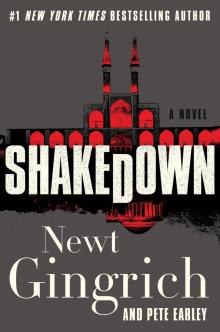 Shakedown
Shakedown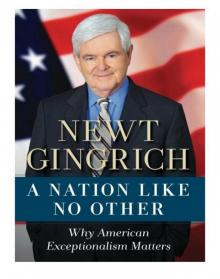 A Nation Like No Other
A Nation Like No Other To Try Men's Souls - George Washington 1
To Try Men's Souls - George Washington 1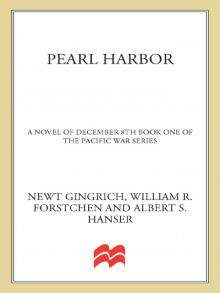 Pearl Harbor: A Novel of December 8th
Pearl Harbor: A Novel of December 8th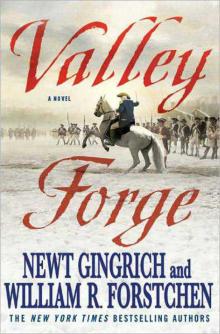 Valley Forge: George Washington and the Crucible of Victory
Valley Forge: George Washington and the Crucible of Victory To Save America
To Save America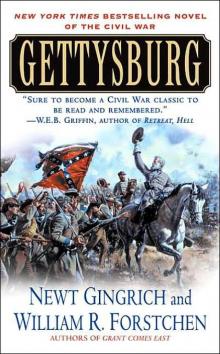 Grant Comes East cw-2
Grant Comes East cw-2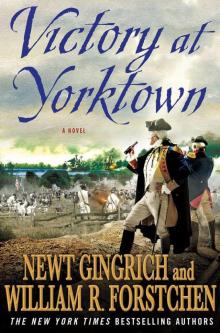 Victory at Yorktown: A Novel
Victory at Yorktown: A Novel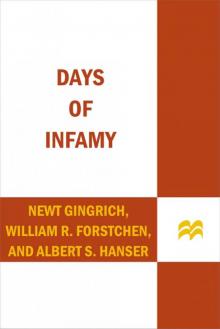 Days of Infamy
Days of Infamy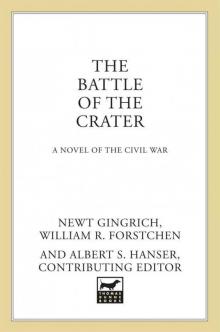 The Battle of the Crater: A Novel (George Washington Series)
The Battle of the Crater: A Novel (George Washington Series)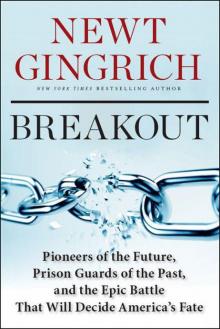 Breakout: Pioneers of the Future, Prison Guards of the Past, and the Epic Battle That Will Decide America's Fate
Breakout: Pioneers of the Future, Prison Guards of the Past, and the Epic Battle That Will Decide America's Fate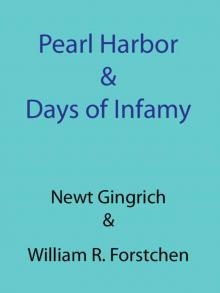 Pearl Harbour and Days of Infamy
Pearl Harbour and Days of Infamy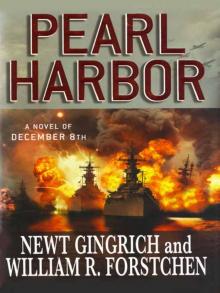 Pearl Harbour - A novel of December 8th
Pearl Harbour - A novel of December 8th Understanding Trump
Understanding Trump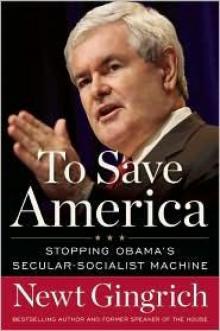 To Save America: Abolishing Obama's Socialist State and Restoring Our Unique American Way
To Save America: Abolishing Obama's Socialist State and Restoring Our Unique American Way